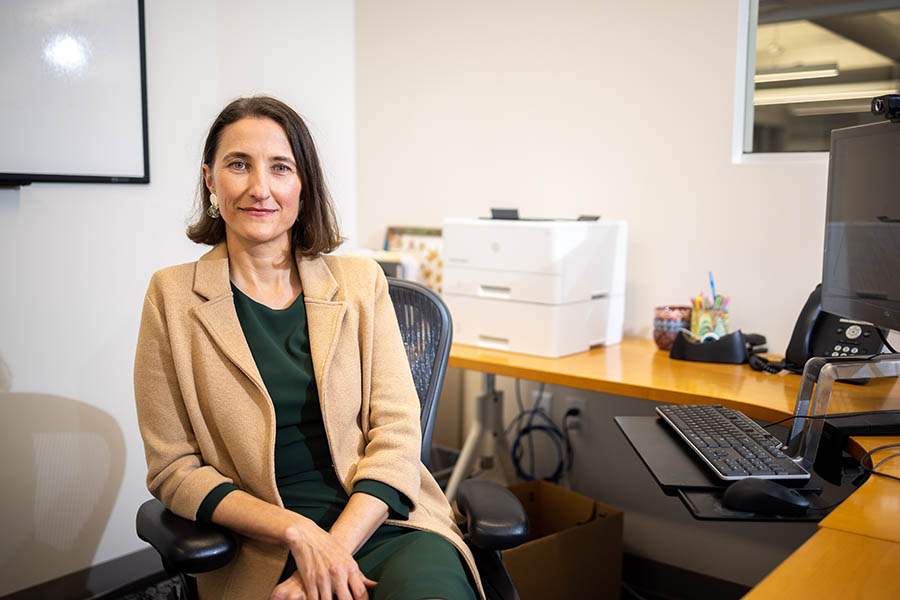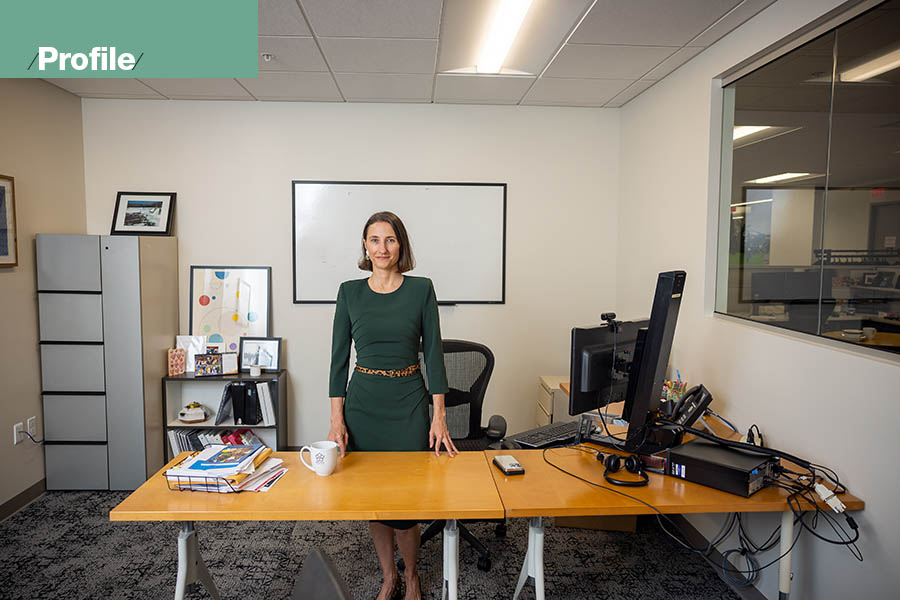Prosper Portland’s director is optimistic about the city’s prospects and her agency’s efforts to overcome a troubling past.
It often seems the longer a person has lived in Portland, the more cynical they become about the city’s evolving character and challenges.
Kimberly Branam is a third-generation Portlander — she grew up in Northeast Portland’s Irvington neighborhood, left for 10 years and has been back for 16 — but she leans against that curve, with grounded optimism about her hometown.
As the executive director of Prosper Portland, it’s part of Branam’s job to be optimistic. Prosper Portland, formerly the Portland Development Commission, is the city’s economic and urban development agency. With a “focus on building an equitable economy by carrying out a comprehensive range of economic development programs,” Prosper Portland’s success in large part depends on growth: Its stated priorities include growing family-wage jobs, creating vibrant neighborhoods and communities, and advancing opportunities for prosperity.
With growth comes growing pains. Portland has faced not only growing pains but devastating setbacks in recent years: a 30% increase in homelessness since 2019, record-breaking homicide rates and a massive increase in drug overdoses (a trend seen across Oregon, due to an increase in methamphetamine’s potency and also fentanyl usage).
Branam sees these issues right outside of her office, located in Portland’s Old Town. The neighborhood is home to numerous agencies that serve people experiencing homelessness, addiction and mental health crises. Many of the people who rely on those resources live in tents on sidewalks and tucked into unused storefronts.
“It’s been important to us that we stay in Old Town,” says Branam. It’s heartbreaking to so frequently witness people in crisis on the streets, she says. She’s been a witness to Portland’s growing houselessness crisis since she was a child, and remembers asking her dad how they could allow this to happen — for people to not have a home. As an adult, she tries to be mindful of what people without homes are going through.
When Branam goes to work, her team is often talking about the role they can play in helping the people who are struggling the most.
“I think that looks like creating inclusive, vibrant neighborhoods that have homes and employment opportunities for everybody,” she says, before a long pause. “But yeah, it’s really, really heavy.”
As for the vacant storefronts, Branam says the pandemic hit downtown hard. But despite what some popular narratives may claim about businesses fleeing Portland and particularly downtown Portland, Branam says it was really a small number of larger tenants “who left largely during the pandemic with many of their workers moving to remote work.”
Branam’s excited about a new generation of small businesses moving into Old Town. Similar to most cities across the country, Portland is being faced with the significant challenge of reimagining its downtown, with hybrid work having such an impact on occupancy rates and foot traffic.
Prosper Portland is facing that challenge by dedicating significant resources to attracting and supporting businesses that recognize “the history, accessibility and unique identity” of Old Town.
“I learned that effective solutions are both identified and led by the people who are the intended beneficiaries.”
Kimberly Branam
“We’re seeing an unprecedented level of collaboration right now across private, public and community leadership throughout the city, and it’s yielding positive results,” Branam says.
The importance of community has been a throughline in Branam’s career and is something she often brings up in speeches and interviews.
After graduating from Colby College in Maine, where she studied English and anthropology, Branam spent three years in Burkina Faso with the Peace Corps. In a small village without running water or electricity, Branam taught over 100 sixth-graders English and math (in French). Over the summers, she worked at a girls camp with the mission of encouraging young girls to attend high school. Burkina Faso is ranked as the 10th-least literate country in the world, but Branam says she witnessed incredible community cohesion and a strong culture of oral history.
Working there, she says, shaped how she approaches economic development: “I learned that effective solutions are both identified and led by the people who are the intended beneficiaries.”
After her time in the Peace Corps, Branam attended Harvard Kennedy School, where she earned a master’s degree in public policy, with an international focus. She thought she would move to Washington, D.C., after graduating, maybe work in a policy think tank. But then she went home to Portland to attend a wedding, and someone told her about an opportunity to work for then city commissioner Sam Adams. The opportunity to return to Portland — which she knew she wanted to do eventually — was enticing.

So Branam came home, where she got the job as Adams’ senior policy director, and then as his economic development director when he became mayor in 2009. In 2011 she was hired by the PDC as its deputy director and became executive director in 2016.
Branam felt good about sharpening her focus from international policy to economic development in the city she calls home.
“There can be an almost postcolonial, continued power dynamic, doing international development work as an American,” she says, “particularly as a white woman abroad.” But she feels she understands the nuances of what it means to be a Portlander and is “really delighted” to be working in her own backyard again.
For her first project as executive director, Branam worked with community partners to develop the agency’s neighborhood economic development strategy, to center racial equity and prevent displacement. This, she says, would empower people of color and those who have historically “not been at the table” to drive the economic development for their community.
More recently, this community-led approach led to the implementation of the Cully Tax Increment Financing District. In the past, TIF districts have been used for ambitious projects like the Oregon Convention Center and Eastbank Esplanade. The Cully TIF is the first one Portland has implemented in over a decade. And, Branam says, it represents a new model in which local organizers came forward first to “pursue a community-centered tax increment finance district that has, at its heart, racial inclusion, racial equity and stabilization.” Branam says TIF is now being used as a tool to maintain the socioeconomic diversity that is so integral to a community like Cully.
“We’re not just bringing people to the table,” she says. “We’re establishing the table together.”
In 2015 the agency began a five-year strategic plan to rebrand and refocus. One result: In 2017, a year after Branam began working for the agency, the PDC changed its name to Prosper Portland. In a press release announcing the change, the agency said the new name “speaks to the agency’s focus on sharing the gains of economic growth equitably” and was part of a “shift toward more inclusive economic development.”
To understand why the PDC would have sought to rebrand, it’s important to know a bit about the agency’s history. Shortly after it was created by a public vote in 1958, the PDC announced that “the men of Portland business and civic organizations will see their reward in the future elimination and prevention of blight and the promotion of industrial development,” according to a history of urban renewal published on Prosper’s own website. Its first urban renewal project focused on the South Auditorium neighborhood, a large section of downtown near what is now called Providence Park. More than 400 buildings — including hundreds of homes and businesses — were demolished in an effort to remake a diverse neighborhood mostly composed of Jewish and Italian immigrants and their families.
In the 1960s, the PDC began to focus urban renewal efforts on Northeast Portland’s majority-Black Albina neighborhood — and in 1970 began working with Legacy Emanuel Hospital to expand the hospital’s footprint in the neighborhood. More than 200 households and 20 businesses were relocated in the effort. Then the anticipated federal funds for the effort dried up.
In December 2022, descendants of Black Portlanders who were displaced for that failed expansion announced they are suing Prosper — along with the city and Legacy Emanuel Health — for generational wealth lost when residents’ homes were demolished in service of a hospital expansion that never happened, in an area where property values have skyrocketed over the past two decades. (In February the defendants filed a motion to dismiss the lawsuit; the plaintiffs filed a brief in opposition to that motion in April.)
“While we cannot comment on the lawsuit,” says Branam, “Prosper Portland has certainly acknowledged and denounced the disproportionate impacts of the era when the federal government funded and local governments enabled the destruction of hundreds of communities across the country, including Central Albina, in the name of ‘urban renewal.’”
Branam says a rebrand can only be successful if it’s true. And she believes Prosper Portland is walking the talk.
“The change in name was the most visible aspect [of the rebrand],” says James Paulson, Workystems, Inc. board chair, who was involved in the hiring of Branam. “But she has changed the way economic development looks at community equity and how a city agency can pivot to address past challenges as it looks to the future.”
One example of Prosper’s efforts is the Portland Means Progress initiative, which connects companies to opportunities to hire underrepresented youth and also to pursue intentional purchasing from BIPOC-owned businesses. To date, Branam says that initiative has been responsible for $400 million in purchases from BIPOC-owned firms.
This spring Branam told Oregon Business that she and her team at Prosper were collecting feedback on the agency’s new economic development strategy, Advance Portland, which they were due to present to Portland City Council on April 26 — shortly after this issue went to press.
The plan, Branam says, is intended to address a key weakness in Portland’s accelerated development over the past 10 years: As a city that’s naturally attracted skilled labor, growth has occurred without proper consideration for “institutional infrastructure, business support, local talent development, cross-sector engagement and regionalism.”
This oversight has resulted in “particularly negative impacts on BIPOC communities and geographic areas of the city, including East Portland and the Central City,” according to the report. Advance Portland is strategically designed to address those negative impacts by aligning economic growth with equity and climate action.
The collecting of feedback, Branam says, is where, as a leader, both her strength and weakness lies. She says she’s always been a deeply curious person — good at asking questions, listening and being open to a lot of different voices and opinions. But sometimes that desire to gather input from everyone — “to hear all the people,” as she puts it — can create a barrier to action. She’s had to work on recognizing when she’s listened enough and it’s time to make decisions.
“Kimberly brings to the table a great combination of leadership, policy smarts and a practical approach to a complex agency and a complex job,” says Tom Kelly, who was board chair of Prosper Portland when Branam started.
Branam says she’s thrilled to see people returning to citywide events like the Portland Winter Light Festival — a favorite of hers and her family’s — and she’s heartened by employment numbers. According to a Prosper Portland report titled “Portland’s Economic Recovery and Job Growth Must Prioritize BIPOC-Communities,” Portland has added 194,400 jobs since April of 2020. As of October 2022, that was 1.2% more jobs than February 2020, before 180,000 jobs were lost in the COVID crisis.
As Portland continues to recover from the widespread damage of the pandemic, Branam says she sees the city in a renaissance period, and that Prosper Portland is working to help “make true what we want to become.” She sees Portland at a critical moment: “We have to figure out what we’re good at,” she says.
As for what she personally hopes for for Portland: “I want to make sure it’s a great place not just for affluent, white-identifying children, but for Black and brown children and for those who are not socioeconomically advantaged.”
Are we there yet? “That’s an open question from my perspective.”
Click here to subscribe to Oregon Business.





